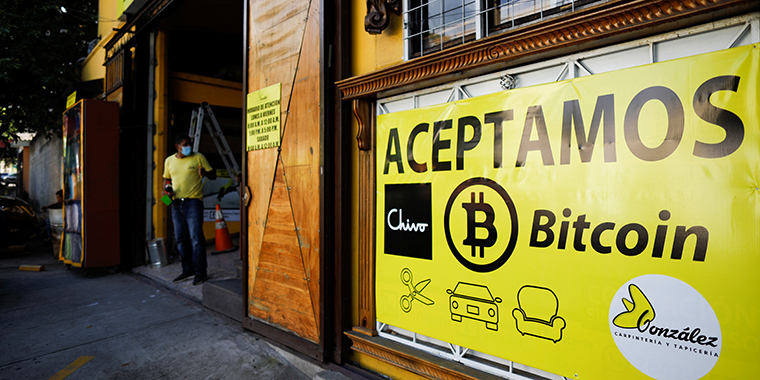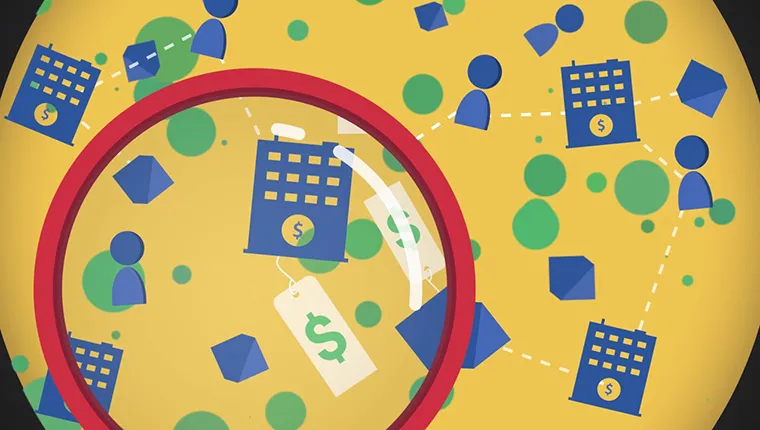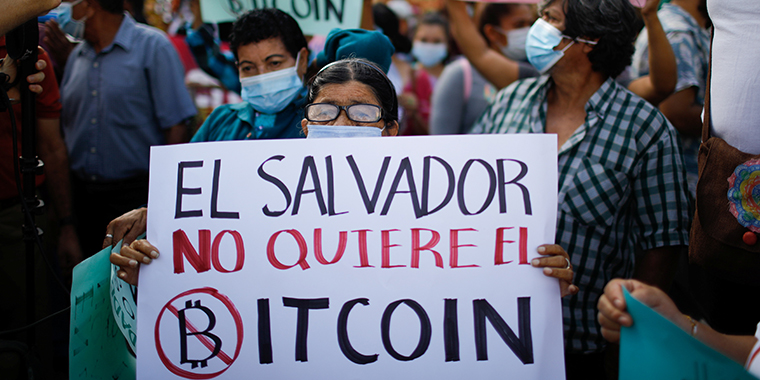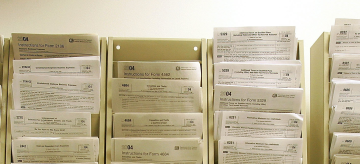What Is Cryptocurrency?
Explore digital currency's uses and abuses in society.
On October 31, 2008, a person—or group of people—calling themself Satoshi Nakamoto published a paper that would change the world. It described a new system for sending and receiving payments using a digital currency called Bitcoin.
Almost fifteen years later, the value of Nakamoto’s Bitcoin skyrocketed, and the currency has become notorious for enabling the rise of teenage millionaires, fueling international crime, and advancing a cutting-edge replacement for cash in society.
Bitcoin was the first of a global explosion of crypto-currencies. Many experts have been highly skeptical of using crypto-currency, which has been characterized by speculative markets and wild swings in price. The sudden collapse of the cryptocurrency company FTX in fall 2022 raised further questions about the value of and need for greater regulation and oversight of crypto-currencies
But why did Nakamoto—whomever that name refers to—go to the trouble of creating a new currency? And how has the electronic cash system Nakamoto outlined in 2008 come to life? This resource walks through the development and mechanics behind digital currencies like Bitcoin and explores their uses and abuses in society.
What is cryptocurrency, and why is it valuable?
Just as dollars, euros, and yen are different types of physical currency, Bitcoin is one type of cryptocurrency (or digital money). Thousands of digital currencies exist, including Dogecoin, Ethereum, and Zcash.
Bitcoin Exchange Rate
Explore the table to see how Bitcoin compares to other currencies.
Before diving into the technical details behind cryptocurrency, it’s important to remember that forms of money only hold value because society has agreed that they do. For centuries, people used shells, leather, and eventually coins as currency. Today, the only reason the pieces of paper Americans call dollars hold value is because the U.S. government says they do and directs people to accept these crumpled green rectangles in exchange for goods and services.
For a while, Bitcoin lacked credibility as a currency. For one, few people initially knew about it, and no one used it for purchases. But that changed forever with what has been described as Bitcoin’s first commercial transaction in 2010. Developer Laszlo Hanyecz exchanged ten thousand Bitcoin—worth about $25 at the time—for two pizzas, signaling that Bitcoin could be traded for goods and services. Today, that sum would be worth hundreds of millions of dollars.
How do transactions work?
Cryptocurrency transactions are conducted without swiping credit cards or forking over cash. Instead, they occur in the digital world using special apps and platforms. Let’s consider one example.
Say Ella wanted to send her friend Craig Bitcoin to pay for dinner.
First, Ella would have to sign up for an account on a website or app that enables her to store and send Bitcoin. Then, she’d have to specify how much Bitcoin to send Craig and address the currency to him using his public key, or Bitcoin address, which operates like an email or home address.
To go forward, the transaction would require Ella’s private key, a sort of password that helps generate a digital signature. After that, a transaction receipt would get broadcast to the Bitcoin network to announce what happened.
The Bitcoin network, which consists of users called miners spread all over the world running special software, would then confirm Ella owns the Bitcoin she’s trying to spend. That process of creating the new space on the blockchain, and of verification, is called mining.
Through this process, miners excavate new Bitcoin. Miners are also rewarded for this work in separate transaction fees, enabling some folks behind the computers to make millions of dollars. (But miners, beware of electricity bills: one study found Bitcoin miners collectively used more power annually than the entirety of Argentina.)
Ella and Craig’s receipt is then tacked on to the mother of all receipts—the universal ledger, or blockchain, which contains a record of every Bitcoin transaction in history. Craig eventually gets his Bitcoin, which stays in his wallet until he decides to purchase something else or cash out. Hundreds of businesses such as Overstock and Whole Foods now accept Bitcoin, and currency exchanges allow investors to turn their Bitcoin into cash.
Why do people use cryptocurrency?
One reason is privacy: one of Bitcoin’s main draws is its promise of relative anonymity. Although banks don’t publicize their customers’ bank statements, they know all about people’s finances. Bitcoin transactions, on the other hand, don’t go through any institutions but are instead published on the blockchain. That ledger contains a record of every Bitcoin transaction but only identifies them by strings of numbers and letters. Those strings enable a measure of privacy, though it’s possible—albeit difficult—to trace transactions back to specific users. Meanwhile, other forms of cryptocurrency claim to offer even greater degrees of anonymity. Certain platforms even enable the blending of cryptocurrency with other currencies, which can make it harder to trace.
Most Recent Bitcoin Transactions
Explore the table to see the ten most recent blockchain transactions.
Another reason is control: Bitcoin operates without relying on financial institutions, allowing people to avoid many transaction fees and make payments anytime, day or night, rather than depend on banking hours.
For others, Bitcoin meets a larger need of operating outside a financial system many suspect of being stacked against ordinary people. After the 2008 global financial downturn, mistrust in banks surged, helping drive an upswing in alternative currencies like Bitcoin. And lately, the currency has provided a pathway for people to avoid economic uncertainty and state-sponsored financial repression, especially in countries where governments break into and lock people out of their bank accounts. Today, people in countries such as Belarus, Lebanon, and Nigeria are using Bitcoin to protect their savings amid economic crises and even to fund protest movements vulnerable to government-sponsored financial crackdowns. Meanwhile, observers also see massive potential for Bitcoin to help people without bank or mobile money accounts—28 percent of men and 35 percent of women globally—to access capital.
A third reason is investment: When people invest money in stocks, fine art, and, yes, cryptocurrency, they’re betting that the value of their purchase will increase and they will make money. For many buyers of Bitcoin, that bet has paid off. The currency was once worth fractions of pennies; now, it’s frequently valued at tens of thousands of dollars. At one point in February 2021, more than one hundred thousand people qualified as Bitcoin millionaires. But raising riches isn’t the only reason people invest. Many Bitcoin buyers are die-hard believers in the currency’s capacity to reshape the world and transfer power from banks and governments to ordinary people.
How have people abused, or been hurt by, cryptocurrency?
The downside to Bitcoin’s semi-anonymity is that it helps bad actors make illicit purchases online. Perhaps the most infamous example was the Silk Road marketplace, a dark-web bazaar that ran on Bitcoin and offered access to a wide range of drugs and illegal services, such as document forgery and computer hacking.
By 2013, the site had sold $1.2 billion worth of goods and services. However, law enforcement eventually shut down the Silk Road and arrested its owner, Ross Ulbricht, who is now serving a life sentence behind bars.
Cryptocurrency’s volatility can also harm investors. Take a look at the line graph below tracking Bitcoin’s value over time. Now, imagine that line is a roller coaster. Scary, right? Trading Bitcoin is like buying a ticket to ride this roller coaster. The swings in value reflect what’s known as volatility, a quality that can have severe consequences for investors. For instance, in 2022 and after several scandals, Bitcoin lost 70 percent of its value since its November 2021 high and, like other cryptocurrencies, faced a "crypto winter."
Compare that situation to the relative stability of the U.S. dollar, the steadiness of which involves factors including the stewardship of the Federal Reserve and the dollar’s prominent role in global trading.
Another major difference between investing with banks versus investing in Bitcoin is insurance. The money that people put in banks gets backed up by a government agency known as the Federal Deposit Insurance Corporation (FDIC). That means that if a bank fails or even burns down, customer savings are mostly safe. But with Bitcoin, those savings are vulnerable to a range of risks, including digital pickpockets—some of whom commit hacks as part of state-sponsored attacks—tech issues, and human error.
For example, one unlucky man had just two password attempts left in January 2021 to access his trove of more than seven thousand Bitcoin, at the time worth about $220 million. And once the money is gone, it’s gone. Bitcoin investors have no FDIC to turn to. Cryptocurrency platforms and exchanges are also a major target for cyber-attacks. For example, in North Korea, ransomware attacks on cryptocurrency arose as the country worked to evade international sanctions.
Environmental concerns are yet another factor. Bitcoin transactions suck up a lot of energy, and research suggests two-thirds of the currency’s underlying network relies on power derived from fossil fuels. For these reasons and others, some experts see cryptocurrency as a major potential contributor to climate change. Take the case of China. The country was once one of the world’s biggest Bitcoin mining hubs, responsible for up to three-quarters of mining around the world. However, the industry created large spikes in energy consumption and carbon emissions, and in 2021, China banned the practice. Although the ban severely reduced instances of Bitcoin mining within the country, studies show that mining is still prevalent.
Will Bitcoin boom or bust?
People are deeply divided over Bitcoin’s future. Although some will be holding on to the currency for the long haul, others warn that, after all the hype, it could be worthless. For instance, the governor of the Bank of England has warned that investors should buy Bitcoin only if they are “prepared to lose all [their] money.”
Although Bitcoin’s followers are certainly interested in making a buck, many have bought into cryptocurrency for its potential to revolutionize the world and redistribute global wealth. But whether cryptocurrency will create a more equal world remains uncertain. For instance, studies suggest women make up just 15 percent of Bitcoin traders and that a tiny minority of owners—some estimate just 2 percent—likely control 95 percent of the currency.
The cryptocurrency roller coaster has taken many twists and turns since 2008. Who knows where the ride is headed next?





